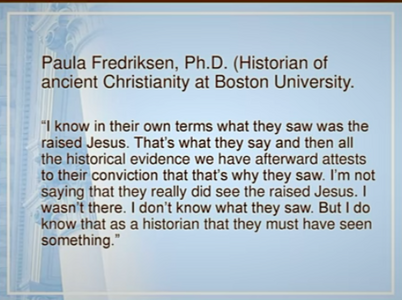hyberzerbidome
Well-known Member
- Jan 3, 2023
- 60
- 110
That I am about to preach to you the gospel, the good word of God that was spoken by his only begotten son Jesus Christ.
That every problem you are facing, everything that troubles you and beats you to the ground, can be solved by Jesus Christ the Son of God?
I ask that you enter this with an open mind. Peace be with you.
I ask that you enter this with an open mind. Peace be with you.
One of the most common arguments against Christianity that is often spouted is that "Jesus didn't even exist/Christians made him up/The Romans made him up"
That point inherently believes that the Gospels can't be accepted as historical sources because they claim that a man walked on water, raised a man from the dead, made the blind see, the deaf hear, and the dumb talk, turned water into wine, and predicted historical events and his own death, so therefore they cannot be accepted as historical sources. So I'll leave them out.
Christian apologist Nabeel Qureshi said that "If we know anything about Jesus, it's that he died."
Here is what we know about Jesus from non-Christian sources that 100% haven't been tampered with by later Christians:
Roman politician and historian Tacitus wrote about Emperor Nero's persecution of Christians and then of the one they worship " Christus" in his book Annals "Consequently, to get rid of the report, Nero fastened the guilt and inflicted the most exquisite tortures on a class hated for their abominations, called Christians by the populace. Christus, from whom the name had its origin, suffered the extreme penalty during the reign of Tiberius at the hands of one of our procurators, Pontius Pilatus, and a most mischievous superstition, thus checked for the moment, again broke out not only in Judæa, the first source of the evil, but even in Rome, where all things hideous and shameful from every part of the world find their centre and become popular."
If Tacitus spoke of Christians and Christ himself so casually it is fair to assume that the majority of the Roman public, at least in the Central and Eastern Mediterranean had heard of Jesus Christ.
Syriac philosopher Mara bar Serapion spoke of Jesus in a letter to his son, written around 73 AD, saying "What advantage did the Jews gain from executing their wise king?".
So we know that Jesus Christ was a real person.
Christian apologist Nabeel Qureshi said that "If we know anything about Jesus, it's that he died."
Here is what we know about Jesus from non-Christian sources that 100% haven't been tampered with by later Christians:
Roman politician and historian Tacitus wrote about Emperor Nero's persecution of Christians and then of the one they worship " Christus" in his book Annals "Consequently, to get rid of the report, Nero fastened the guilt and inflicted the most exquisite tortures on a class hated for their abominations, called Christians by the populace. Christus, from whom the name had its origin, suffered the extreme penalty during the reign of Tiberius at the hands of one of our procurators, Pontius Pilatus, and a most mischievous superstition, thus checked for the moment, again broke out not only in Judæa, the first source of the evil, but even in Rome, where all things hideous and shameful from every part of the world find their centre and become popular."
If Tacitus spoke of Christians and Christ himself so casually it is fair to assume that the majority of the Roman public, at least in the Central and Eastern Mediterranean had heard of Jesus Christ.
Syriac philosopher Mara bar Serapion spoke of Jesus in a letter to his son, written around 73 AD, saying "What advantage did the Jews gain from executing their wise king?".
So we know that Jesus Christ was a real person.
Besides the point about the gospels that I mentioned earlier, one of the main arguments against their validity is that they were allegedly written between 40 and 70 years after Jesus' death, so how can they be considered accurate sources?
Typically we are told that the Gospel of Mark came first and was written in the late 60's. Matthew was within 10 years of Mark, Luke was within 10 years of Matthew, and John was completed sometime in the 90's.
Well I argue that they were written far earlier than that; here is my evidence:
One of the main reasons for this dating is that in the Gospels, Jesus predicts the destruction of the temple in Jerusalem, which happened in the year 70; so from a secular perspective, it is impossible that any of them were written before 70. But if you accept that Christ was the Son of God, that point falls apart.
The only other reasons are wishy-washy copium like "the style of Greek the New Testament was written in is more synonymous with the late 1st Century." Or "the knowledge of Jewish-Roman relations that is expressed in the Gospels was not common in the early 1st Century."
Nothing definitive. Here is the proof they were written earlier:
The Book of Acts is the first book after the Gospels in the New Testament. It tells the story of the Apostles and their mission to spread Christ's message in the decades following his death.
The Book of Acts was written by St. Luke, who also wrote the Gospel According to Luke. So it is fair to see Acts as a sequel to Luke.
Acts ends during the trial of St. Paul, which took place in the year 62. The ending is strange as we never hear what happens to Paul, rather the book just ends in the middle of his trial
The knowledge that he was executed comes from letters written by Christians about his death.
So why does Acts end so abruptly? If Luke had a detailed account of the literal words spoken by Paul during his trial, how did he not know the outcome?
Also, the fate of the first Pope, Saint Peter is never mentioned in Acts, despite him being the main character (Peter was infamously crucified upside-down in Rome by Emperor Nero).
Some scholars claim that Peter was killed as early as the 40s, but most agree that it was sometime in the 60s. If his crucifixion was in the 40s than why isn't the account of his death in Acts? We know that Luke had a strong knowledge of events happening long after that.
It's because Luke, or whoever his source was, never saw the end of Paul's trial. Acts was likely smuggled out of Rome during the trial to safeguard its information (Christians were being heavily persecuted by Nero at the time).
Why else wouldn't Luke describe the very important executions of Paul or Peter, arguably the two most important people in Christianity after Jesus and Mary?
So, if we know that Acts was finished in 62, that means the Gospel of Luke was written around a year or two before that, as writing books took many months or even a year at the time.
So let's say Luke was written in 61. For the benefit of the doubt let's say that there were 5 years between each Gospel. So that means that Matthew was written in 56 and Mark was written in 51. In reality it was likely more than 5 years between them.
Now most scholars agree that Mark and/or Matthew was inspired by another Gospel that has been lost to time (known as Q). So using the same system that Gospel was written in the year 46.
So that means that a book documenting the life, death, and resurrection of Jesus Christ was written at maximum within 13 years of his death. It was likely earlier.
Another point: Paula Frederickson said this about Christ's resurrection:

So the Apostles really did believe that they saw Jesus. The best evidence of this is the previously mentioned St. Peter. As I said, Peter was crucified for his beliefs. Nero gave him the option to denounce Christ but he refused.
According to the Bible, Peter was one of the people that saw and spoke with the resurrected Christ, so if Peter was willing to be crucified for his beliefs, he was 100% sure that Jesus was the Son of God and rose from the dead.
Peter was either insane, heavily intoxicated during the resurrection, or genuinely did see Jesus Christ rise from the dead.
Typically we are told that the Gospel of Mark came first and was written in the late 60's. Matthew was within 10 years of Mark, Luke was within 10 years of Matthew, and John was completed sometime in the 90's.
Well I argue that they were written far earlier than that; here is my evidence:
One of the main reasons for this dating is that in the Gospels, Jesus predicts the destruction of the temple in Jerusalem, which happened in the year 70; so from a secular perspective, it is impossible that any of them were written before 70. But if you accept that Christ was the Son of God, that point falls apart.
The only other reasons are wishy-washy copium like "the style of Greek the New Testament was written in is more synonymous with the late 1st Century." Or "the knowledge of Jewish-Roman relations that is expressed in the Gospels was not common in the early 1st Century."
Nothing definitive. Here is the proof they were written earlier:
The Book of Acts is the first book after the Gospels in the New Testament. It tells the story of the Apostles and their mission to spread Christ's message in the decades following his death.
The Book of Acts was written by St. Luke, who also wrote the Gospel According to Luke. So it is fair to see Acts as a sequel to Luke.
Acts ends during the trial of St. Paul, which took place in the year 62. The ending is strange as we never hear what happens to Paul, rather the book just ends in the middle of his trial
The knowledge that he was executed comes from letters written by Christians about his death.
So why does Acts end so abruptly? If Luke had a detailed account of the literal words spoken by Paul during his trial, how did he not know the outcome?
Also, the fate of the first Pope, Saint Peter is never mentioned in Acts, despite him being the main character (Peter was infamously crucified upside-down in Rome by Emperor Nero).
Some scholars claim that Peter was killed as early as the 40s, but most agree that it was sometime in the 60s. If his crucifixion was in the 40s than why isn't the account of his death in Acts? We know that Luke had a strong knowledge of events happening long after that.
It's because Luke, or whoever his source was, never saw the end of Paul's trial. Acts was likely smuggled out of Rome during the trial to safeguard its information (Christians were being heavily persecuted by Nero at the time).
Why else wouldn't Luke describe the very important executions of Paul or Peter, arguably the two most important people in Christianity after Jesus and Mary?
So, if we know that Acts was finished in 62, that means the Gospel of Luke was written around a year or two before that, as writing books took many months or even a year at the time.
So let's say Luke was written in 61. For the benefit of the doubt let's say that there were 5 years between each Gospel. So that means that Matthew was written in 56 and Mark was written in 51. In reality it was likely more than 5 years between them.
Now most scholars agree that Mark and/or Matthew was inspired by another Gospel that has been lost to time (known as Q). So using the same system that Gospel was written in the year 46.
So that means that a book documenting the life, death, and resurrection of Jesus Christ was written at maximum within 13 years of his death. It was likely earlier.
Another point: Paula Frederickson said this about Christ's resurrection:

So the Apostles really did believe that they saw Jesus. The best evidence of this is the previously mentioned St. Peter. As I said, Peter was crucified for his beliefs. Nero gave him the option to denounce Christ but he refused.
According to the Bible, Peter was one of the people that saw and spoke with the resurrected Christ, so if Peter was willing to be crucified for his beliefs, he was 100% sure that Jesus was the Son of God and rose from the dead.
Peter was either insane, heavily intoxicated during the resurrection, or genuinely did see Jesus Christ rise from the dead.
Last edited:



 .
.